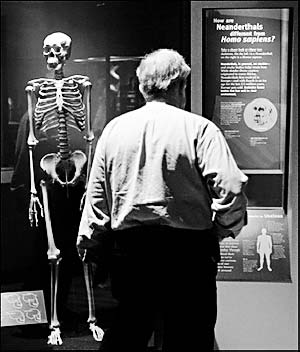 |
|
|
|
双语环球新闻:人类进化正在加速(图)http://www.sina.com.cn
2007年12月17日 13:45 信息时报
 人类进化正在加速
People are evolving more rapidly than in the distant past, with residents of various continents becoming increasingly different from one another, researchers say. "I was raised with the belief that modern humans showed up 40,000 to 50,000 years ago and haven't changed," explained Henry C. Harpending, an anthropologist at the University of Utah. "The opposite seems to be true.Our species is not static." That doesn't mean we should expect major changes in a few generations, though, evolution occurs over thousands of years. 最新研究发现,与遥远的过去相比,目前人类的进化速度已经加快了,生活在各大洲的人彼此之间的差别越来越大。 “人们一直认为,现代人类出现在4到5万年前,其后就没有改变过,”美国人类学家亨利说,“事实可能正好相反。人类并不是一成不变的。”当然,人类的进化不会在几代内完成,还是需要成千上万年的时间。 Harpending and colleagues looked at the DNA of humans and that of chimpanzees, our closest relatives, they report in this week's online edition of Proceedings of the National Academy of Sciences.If evolution had been proceeding steadily at the current rate since humans and chimps separated 6 million years ago there should be 160 times more differences than the researchers found. That indicates that human evolution had been slower in the distant past, Harpending explained. 亨利和他的同事研究了人类和黑猩猩的DNA,得出了新的结论。如果人类和黑猩猩于600万年前分化之后一直按现在的速度进化的话,二者之间的不同之处应该比研究人员发现的多160倍才对。这说明,人类在过去进化的速度比现在慢。 "Rapid population growth has been coupled with vast changes in cultures and ecology, creating new opportunities for adaptation," the study says. "The past 10,000 years have seen rapid skeletal and dental evolution in human populations, as well as the appearance of many new genetic responses to diet and disease." 研究称,“人口快速增长与文化和生态的剧变联系在一起,有了更多的环境改变让人类适应。在过去的一万年间,人类的骨骼和牙齿的进化很快,遗传基因也对饮食和疾病作出了反应。”
【发表评论】
不支持Flash
|
||||